2010年高考英语第二轮复习教案-情态动词和虚拟语气
- 格式:doc
- 大小:782.50 KB
- 文档页数:9
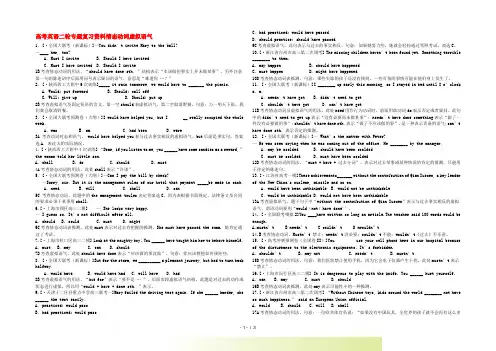
高考英语二轮专题复习资料情态动词虚拟语气1.[·全国大联考(新课标)]—You didn’t invite Mary to the ball?—____ her, too?A.Must I invite B.Should I have invitedC.Must I have invited D.Should I invite1B考查情态动词的用法。
“should have done sth.”结构表示“本该做但事实上并未做某事”。
另外注意第一句的陈述语序后面用问号表示疑问的语气,意思是“难道你…?”2. [·陕西西工大附中6次训练]_____ it rain tomorrow, we would have to _______ the picnic.A. Would; put forwardB. Should; call offC. Will; give upD. Should; put up2B考查虚拟语气及固定短语的含义。
第一空should表虚拟语气,第二空取消野餐。
句意:万一明天下雨,我们就会取消野餐。
3.[·全国大联考预测卷(大纲)]I would have helped you, but I __ really occupied the whole week.A.was B.am C.had been D.were3A 考查动词时态和语气。
would have helped you表与过去事实相反的虚拟语气。
but后面是事实句。
答案选A,表过去的实际情况。
4. [·陕西西工大附中4次训练] “Dear, if you listen to me, you ______ have some candies as a reward,” the woman told her little son.A. shallB. doC. shouldD. must4A考查情态动词的用法。
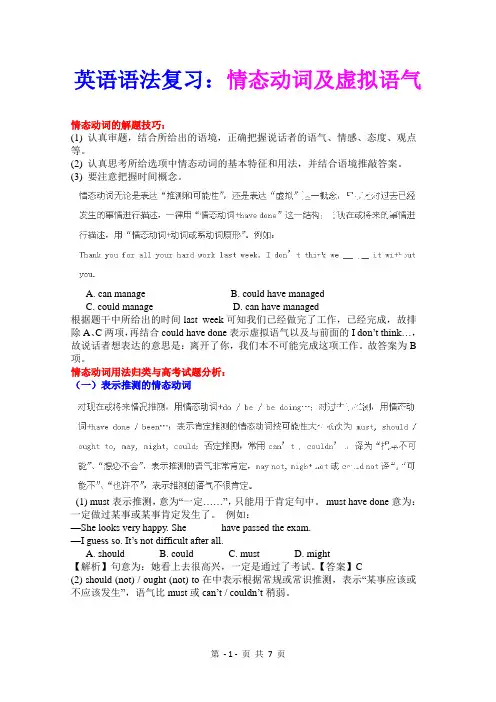
英语语法复习:情态动词及虚拟语气情态动词的解题技巧:(1) 认真审题,结合所给出的语境,正确把握说话者的语气、情感、态度、观点等。
(2) 认真思考所给选项中情态动词的基本特征和用法,并结合语境推敲答案。
(3) 要注意把握时间概念。
A. can manageB. could have managedC. could manageD. can have managed根据题干中所给出的时间last week可知我们已经做完了工作,已经完成,故排除A、C两项,再结合could have done表示虚拟语气以及与前面的I don’t think…,故说话者想表达的意思是:离开了你,我们本不可能完成这项工作。
故答案为B 项。
情态动词用法归类与高考试题分析:(一)表示推测的情态动词(1) must表示推测,意为―一定……‖,只能用于肯定句中。
must have done意为:一定做过某事或某事肯定发生了。
例如:—She looks very happy. She ______ have passed the exam.—I guess so. It’s not difficult after all.A. shouldB. couldC. mustD. might【解析】句意为:她看上去很高兴,一定是通过了考试。
【答案】C(2) should (not) / ought (not) to在中表示根据常规或常识推测,表示―某事应该或不应该发生‖,语气比must或can’t / couldn’t稍弱。
(3) can, could表达推测时,一般用于疑问句和否定句中;can用于肯定句中表示一种理论上的可能性,并不牵涉是否真的会发生,在这种用法中can只能与动词原形连用;could用于肯定句中,语气比may/ might更弱。
①You ______ be hungry already — you had lunch only two hours ago!A. wouldn’tB. can’tC. mustn’tD. needn’t②She ______ have left school, for her bike is still here.A. can’tB. wouldn’tC. shouldn’tD. needn’t③It is usually warm in my hometown in March, but it ____ be rather cold sometime.A. mustB. canC. shouldD. would④Peter ____ be really difficult at times even though he’s a nice person in general.A. shallB. shouldC. canD. must(4)may (not) / might (not)表达一种不太把握的推测,意为―或许,可能‖;might 的语气比may较婉转。
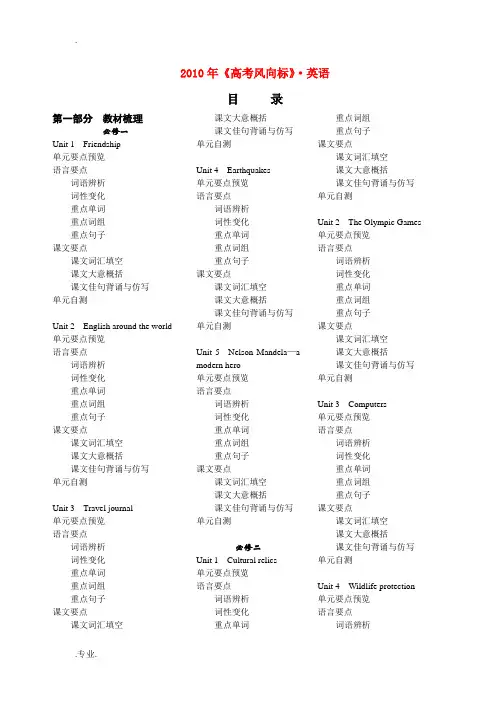
.2010年《高考风向标》·英语目录第一部分教材梳理必修一Unit 1 Friendship单元要点预览语言要点词语辨析词性变化重点单词重点词组重点句子课文要点课文词汇填空课文大意概括课文佳句背诵与仿写单元自测Unit 2 English around the world 单元要点预览语言要点词语辨析词性变化重点单词重点词组重点句子课文要点课文词汇填空课文大意概括课文佳句背诵与仿写单元自测Unit 3 Travel journal单元要点预览语言要点词语辨析词性变化重点单词重点词组重点句子课文要点课文词汇填空课文大意概括课文佳句背诵与仿写单元自测Unit 4 Earthquakes单元要点预览语言要点词语辨析词性变化重点单词重点词组重点句子课文要点课文词汇填空课文大意概括课文佳句背诵与仿写单元自测Unit 5 Nelson Mandela—amodern hero单元要点预览语言要点词语辨析词性变化重点单词重点词组重点句子课文要点课文词汇填空课文大意概括课文佳句背诵与仿写单元自测必修二Unit 1 Cultural relics单元要点预览语言要点词语辨析词性变化重点单词重点词组重点句子课文要点课文词汇填空课文大意概括课文佳句背诵与仿写单元自测Unit 2 The Olympic Games单元要点预览语言要点词语辨析词性变化重点单词重点词组重点句子课文要点课文词汇填空课文大意概括课文佳句背诵与仿写单元自测Unit 3 Computers单元要点预览语言要点词语辨析词性变化重点单词重点词组重点句子课文要点课文词汇填空课文大意概括课文佳句背诵与仿写单元自测Unit 4 Wildlife protection单元要点预览语言要点词语辨析.词性变化重点单词重点词组重点句子课文要点课文词汇填空课文大意概括课文佳句背诵与仿写单元自测Unit 5 Music单元要点预览语言要点词语辨析词性变化重点单词重点词组重点句子课文要点课文词汇填空课文大意概括课文佳句背诵与仿写单元自测必修三Unit 1 Festivals around the world 单元要点预览语言要点词语辨析词性变化重点单词重点词组重点句子课文要点课文词汇填空课文大意概括课文佳句背诵与仿写单元自测Unit 2 Healthy eating 单元要点预览语言要点词语辨析词性变化重点单词重点词组重点句子课文要点课文词汇填空课文大意概括课文佳句背诵与仿写单元自测Unit 3 The Million PoundBank Note单元要点预览语言要点词语辨析词性变化重点单词重点词组重点句子课文要点课文词汇填空课文大意概括课文佳句背诵与仿写单元自测……第二部分语法专题专题一冠词专题二名词专题三代词专题四数词专题五形容词和副词专题六介词专题七情态动词专题八非谓语动词专题九动词和动词短语专题十动词的时态专题十一动词的语态专题十二句子种类专题十三名词性从句专题十四定语从句专题十五状语从句专题十六倒装句和省略句专题十七强调句专题十八虚拟语气专题十九主谓一致专题二十直接引语和间接引语第三部分高考题型讲练听力完形填空语法填空阅读理解信息匹配基础写作读写任务第一部分教材梳理选修七Unit 1 Living well 一、语言要点I单元要点预览〔旨在让同学整体了解本单元要点〕II 词语辨析(旨在提供完形填空所需材料)III 词性变化〔旨在提供语法填空所需材料〕IV 重点词汇〔旨在提供综合运用所需材料〕1. ambition (n.) 雄心[重点用法]ambitious adj. 志向远大的; 有雄心壮志的;有野心的be ambitious for [power, social position, etc.] 极欲获得[权力, 社会地位等]be ambitious of success渴望成功be ambitious to serve the people一心想为人民服务[典例]1) Her ambition is the presidency. 她的抱负是成为一名总统2) After several hours’ work, she had no ambition to go dancing. 没有精力去跳舞了3) The prince was attracted by the girl’s beauty, and ambitious to marry her.王子为女孩的美貌打动了,渴望能娶到她。
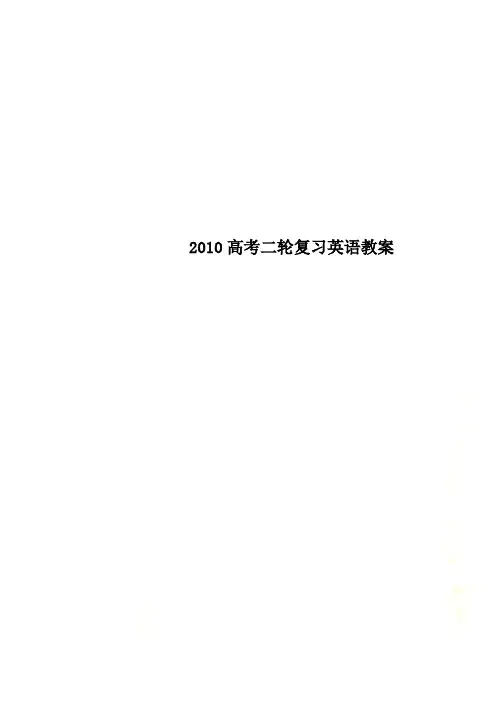
2010高考二轮复习英语教案2010高考二轮复习英语教案专题八非谓语动词和独立主格结构【专题要点】非谓语动词和独立主格结构主要用法如下:1.动名词和动词不定式作主语、宾语;2.只跟动名词作宾语的动词或动词短语;3.只跟动词不定式作宾语的常见动词;4.既可以跟动名词又可以跟动词不定式作宾语,且意义不同的动词或短语;5.不定式、现在分词、过去分词作宾语补足语的区别;6.不定式、现在分词、过去分词作定语时的区别;7.不定式、现在分词、过去分词作状语时的区别;8.动名词的复合结构在句中作状语;9.there be 结构的两种非谓语形式;10.独立主格结构在句中作状语;11.with复合结构在句中作状语或定语。
【考纲要求】非谓语动词包括不定式、动词-ing 形式和过去分词三种形式。
动词的非谓语形式是中学英语语法的重点和难点,也是每年高考热点中的热点, 考纲要求掌握:非谓语动词的时态和语态;他们在英语句子中的作用;非谓语动词的基本用法和含义,非谓语动词在句子中可以充当它的构成方式和在句子中的作用以及与with复合结构和分词之间的辨析的关系。
【知识网络】非谓语动词用法非谓语动词主要包括不定式、动名词和现在分词。
为了区分这三种不同的非谓语动词的用法和含义,我们将分别从三种非谓语动词在句子中做主语、宾语、宾语补足语、定语、状语、表语以及一些特殊结构句型等角度来区分其用法和细微含义。
1.不定式和动名词作主语的区别(1)动名词作主语通常表示抽象动作;而不定式作主语表示具体动作。
Smoking is prohibited(禁止)here.这里禁止抽烟。
(抽象)It is not very good for you to smoke so much.你抽这么多烟对你身体很不好。
(具体) (2)动名词作主语时,通常用以表示一件已知的事或经验。
不定式短语通常用来表示一件未完成的事或目的。
Climbing mountains is interesting.爬山很有趣。
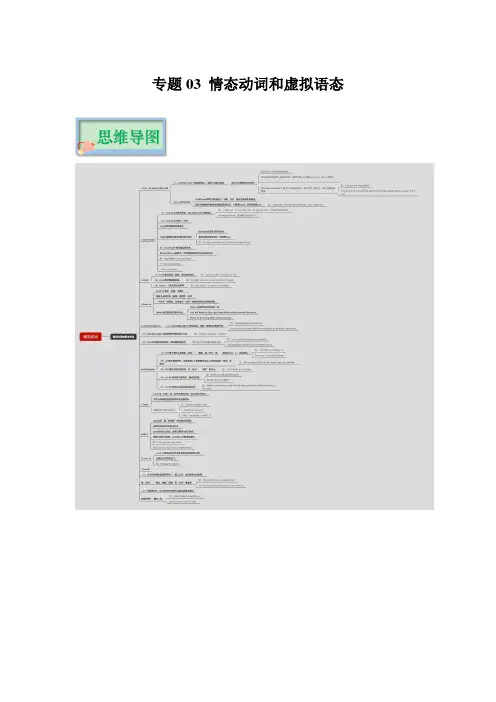
专题03 情态动词和虚拟语态情态动词★ 情态动词:can, could, may, might, must, ought to, shall, will, would, need ,dare1. 表示推测的情态动词1.1基本原则:1.1.2 对现在或将来情况推测,用情态动词+do / be / be doing…对过去的推测,用情态动词+have done / been…1.1.3表示肯定推测的情态动词,按可能性由大到小依次为:must> should / oughtto>may>might>could1.1.4否定推测,按语气由强到弱依次为:can’t / couldn’t(根本不可能)>may not> mightnot/could not(可能不)。
1.2 具体用法:1.2.1 must be表示推测,意为“一定是……” 只用于肯定句中must have done意为“一定做过某事或某事肯定发生了” 并且有前文铺垫e.g. Listen! There must be some children in the room.The road is wet. It must have rained last night.1.2.2 should (not) / ought (not) to在中表示根据常规或常识推测,表示“某事应该或不应该发生”e.g. It is nearly 7 o’clock. Jack should be here at any moment.You shouldn’t be texting in the class now. We are having a lesson.(should not 含有责备之意)1.2.3 can, could表达推测时,一般用于疑问句和否定句中;can用于肯定句中表示一种理论上的可能性,意为“有时候会…”,并不牵涉是否真的会发生;could用于肯定句中,语气比may/ might更弱。
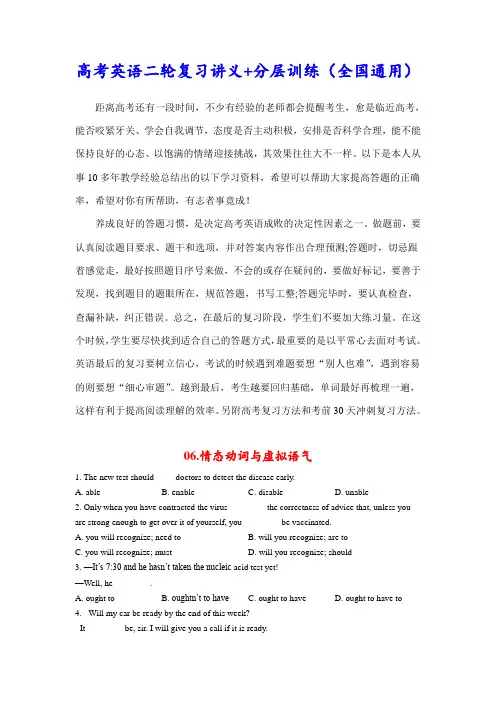
高考英语二轮复习讲义+分层训练(全国通用)距离高考还有一段时间,不少有经验的老师都会提醒考生,愈是临近高考,能否咬紧牙关、学会自我调节,态度是否主动积极,安排是否科学合理,能不能保持良好的心态、以饱满的情绪迎接挑战,其效果往往大不一样。
以下是本人从事10多年教学经验总结出的以下学习资料,希望可以帮助大家提高答题的正确率,希望对你有所帮助,有志者事竟成!养成良好的答题习惯,是决定高考英语成败的决定性因素之一。
做题前,要认真阅读题目要求、题干和选项,并对答案内容作出合理预测;答题时,切忌跟着感觉走,最好按照题目序号来做,不会的或存在疑问的,要做好标记,要善于发现,找到题目的题眼所在,规范答题,书写工整;答题完毕时,要认真检查,查漏补缺,纠正错误。
总之,在最后的复习阶段,学生们不要加大练习量。
在这个时候,学生要尽快找到适合自己的答题方式,最重要的是以平常心去面对考试。
英语最后的复习要树立信心,考试的时候遇到难题要想“别人也难”,遇到容易的则要想“细心审题”。
越到最后,考生越要回归基础,单词最好再梳理一遍,这样有利于提高阅读理解的效率。
另附高考复习方法和考前30天冲刺复习方法。
06.情态动词与虚拟语气1. The new test should ____ doctors to detect the disease early.A. ableB. enableC. disableD. unable2. Only when you have contracted the virus ________ the correctness of advice that, unless you are strong enough to get over it of yourself, you ________ be vaccinated.A. you will recognize; need toB. will you recognize; are toC. you will recognize; mustD. will you recognize; should3. —It’s 7:30 and he hasn’t taken the nucleic acid test yet!—Well, he ________.A. ought toB. oughtn’t to haveC. ought to haveD. ought to have to4. - Will my car be ready by the end of this week?- It ________ be, sir. I will give you a call if it is ready.A. shouldB. shallC. wouldD. must5. —Can I please have a little more time?—No, you_________. The test time is up.A. can’tB. couldn’tC. mustn’tD. needn’t6. — You burned your face and arms.—Yes, I in the shade like all the other tourists at noon.A. should beB. must have beenC. must beD. should have been7. When reading The Road Not Taken, one cannot help but ________ in one’s mind images of a peaceful wood deep within the countryside.A. seeingB. to seeC. seeD. seen8. I heard that your team won the football match yesterday afternoon. You ______ have performed quite well.A. canB. mustC. shouldD. need9. Your cousin ________ his trip in Jixian County, didn’t he? He looks amazingly different.A. will have enjoyedB. should have enjoyedC. can have enjoyedD. must have enjoyed10. Technology is supposed to make our lives easier, but it________ also be depressing at times.A. shouldB. willC. canD. must11. Living and working with others ______ sometimes be complicated, and humour makes this easier.A. mustB. canC. shouldD. need12. You ______ some moments when you were disappointed. If so, how did you deal with them?A. must be havingB. must have hadC. must haveD. must had13. There was no sign of a break-in, so the thieves ________ someone on the inside helping them.A. must have hadB. could have hadC. needn’t have hadD. might have14. —________ you make a little less noise please? I’m trying to work.—Oh. sorry.A. MustB. NeedC. ShouldD. Can15. The change in climate may________our mood.A. affectB. affectsC. effectD. effects16. —Who’s singing in the next room? Is it Lucy?—It ______ be her. She has gone to New York.A. can’tB. shouldn’tC. mustn’tD. won’t17. — See to it that the door ________ before you go to bed.—But the door just ________ close.A. is fastened… doesn’tB. is fastened…won’tC. will be fastened… won’tD. will be fastened… doesn’t18. Walking alone in the deserted town, John felt his blood running cold. He thought he_________ Tom to go with him.A. might askB. should askC. should have askedD. might have asked19. A police spokesman said if the man had gone much further in opening the letter, he _________ killed.A. may beB. could have beenC. would beD. should have been20. Whatever Brad said _________ have made her angry because she totally lost her temper.A. mightB. mustC. wouldD. should21. —I wonder why Mr Green hasn’t showed up at the meeting yet.—I’m not sure, but he ________ in a traffic jam driving here.A. could be stuckB. might stuckC. might have been stuckD. must have stuck22. — Oh, my God! I just missed the last bus back home.—That’s really bad. I’m sure you it, but you just didn’t hurry up.A. should have caughtB. could have caughtC. could catchD. can catch23. — Tom is still unhappy today.—It’s all your fault. You ______ to him yesterday for your mindless mistake.A. should apologizeB. should have apologizedC. shouldn’t have apologizedD. must apologize24. I ________ have finished the report without your timely help. Thank you so much!A. couldB. couldn’tC. mustD. mustn’t25. He ________ have completed his work; otherwise, he wouldn’t be enjoying himself by the seaside.A. shouldB. needn’tC. mustD. can’t26. —A man answered the phone. I suppose it was her husband.—It ______ her husband. He has been dead for ages.A. mustn’t beB. couldn’t have beenC. may not have beenD. mustn’t have been27. —Few of my fellows passed the politics quiz this time on campus.—How come? It ________ tough.A. should beB. might beC. must have beenD. could have been28. It is unbelievable that such an excellent football team ________have failed in the finals.A. wouldB. mustC. shouldD. could29. The spokesman did not regret what he had said at the conference but felt that he ________ it indirectly.A. could expressB. would expressC. could have expressedD. must have expressed30. We showed up early and had to wait two hours before the ceremony began. We ________.A. shouldn’t hurryB. needn’t have hurriedC. mustn’t have hurriedD. wouldn’t hurry31. — Where are you going for your holidays this summer?—Well, it’s not been decided. I ______go to the countryside to see my parents.A. mightB. needC. canD. must32. His appearance has changed so much that you ________ not recognize him.A. may wellB. may as wellC. maybeD. should33. Public health experts kept telling citizens it was of utmost importance that social distancing and hygiene habits ________ amid the pandemic.A. were to be keptB. had to be keptC. must be keptD. should be kept34. Just as I was hurrying to class, there ________ come Tom with a long story to tell you.A. couldB. mustC. mightD. would35. We are surprised that his prediction about the experiment result ________ be so precise.A. shouldB. couldC. mustD. will36. The school adviser recommended he ________the lost time.A. made ofB. can make itC. making upD. make up for37. He insisted that he________ in good health and________ to work there.A. was; be sentB. is; be sentC. is; was sentD. was; send38. It is demanded that every student in Zhixin High School ________ themselves to studying.A. devotesB. devotedC. is devotedD. devote39. Helen recommended that I ______ receive further education.A. was sent toB. sent toC. was sending toD. be sent to40. It _____ that every student _____ for at least 30 minutes every day.A. is recommended, work outB. recommends, works outC. is recommended, works outD. is recommending, work out41. It is strongly recommended that the date ________ by two days.A. should advanceB. be advancedC. has been advancedD. is advanced42. I advised that he ________ to the hospital at once, but he insisted that he ________ quite well then.A. was sent; feltB. be sent; was feelingC. be sent; feelD. should be sent; should feel43. If he had not gone out in the storm, he ________ alive now.A. will beB. would beC. would have beenD. is44. All the doctors in the hospital insisted that he ___ badly wounded and that he ___ at once.A. shouldn’t be; be operated onB. were; must be operated onC. was; should be operatedD. was; be operated on45. His suggestion, according to the article he wrote for the Post, is that organic farming ________to guarantee the quality of both plants and the soil.A. be adoptedB. is adjustedC. should be adaptedD. can be attained46. At the routine office meeting, the headmaster insisted the problems ______ paid special attention to.A. referred to beingB. referred to beC. refer to beingD. refer to be47. A professor at the Academy has proposed that a fund _________ to raise money.A. establishesB. establishedC. be establishedD. will establish48. The manager recommended that the fresh graduate ______ a chance.A. be givenB. should giveC. would be givenD. should be giving49. The professor highly recommends that we________the hardest task first________we can avoid procrastination(拖延).A. deal with, so thatB. must deal with, soC. should deal with, so as toD. be dealt with, in order that50. Our headteacher treats us ________ we were her own children.A. even ifB. even thoughC. as ifD. if only51. The school recommends parents________ their children to swim in rivers or lakes during summer holidays.A. not permitB. do not permitC. mustn’t permitD. couldn’t permit52. ______ the picture of the popular singer, I would show it to you right now.A. I had takenB. Did I takeC. Had I takenD. I took53. If you ________ that late movie last night, you wouldn’t be so sleepy now.A. haven’t watchedB. hadn’t watchedC. didn’t watchD. wouldn’t have watched54. The order came that all the small coal mines ________down in half a year.A. would be closedB. should be closedC. must be closedD. would close55. —Have you ever been to the Great Wall?—No, but I wish I ________.A. willB. haveC. didD. had56. ________the clouds, you would find the airplane in the sky easilyA. Had it not been forB. If it were notC. If it had not been forD. Were it not for57. ________ what was going to happen next, I would never have left her alone.A. Had I knownB. If I knowC. If I knewD. If had I known58. My demand was that the information referred to in my report ________to Mr. Brown without delay.A. should emailB. emailedC. must be emailedD. be e-mailed59. I can’t stand the young man sitti ng in the front. He always talks as though he ________ everything.A. knewB. knowsC. has knownD. had known60. Linda couldn’t have answered the question so easily if she ________ a few books on world history before hand.A. hadn’t readB. hasn’t readC. wouldn’t have readD. didn’t read61. Thomas can take his motor apart and put it back together again. I certainly wish he ________ me how.A. teachesB. will teachC. has taughtD. would teach62. The new traffic law requires that everyone ________ his or her car checked at least once a year.A. hasB. hadC. will haveD. have63. How I wish I ________ to repair the cellphone! I only made it worse.A. had triedB. hadn’t triedC. have triedD. didn’t try64. My suggestion is that more people from all walks of life________ to finance the Project with their deeper love for these children.A. be encouragedB. are encouragedC. were encouragedD. should encourage65. It is essential that these application forms ________ back as early as possible.A. are sentB. be sentC. will be sentD. should send66. If he ________ to the teacher attentively yesterday, he ________ the answer to the problem now.A. had listened; would have knownB. listened; would knowC. listened; would have knownD. had listened; would know67. If only I ________ an umbrella last night! I was wet through.A. tookB. should takeC. had takenD. take68. ________ the traffic jam on the highway, we should have arrived at the stadium earlier.A. In spite ofB. Because ofC. But forD. Due to69. Sorry, I am too busy at the moment. If I ________free, I would certainly go for a walk with you.A. have beenB. had beenC. amD. were70. It was demanded that the working conditions in that area ________ as soon as possible.A. must improveB. improveC. was improvedD. be improved71. Look at the situation I’m in. If only I ________ your advice earlier!A. tookB. would takeC. had takenD. should take72. The professor insisted that his solution________more practical and that we________it into practice as soon as possible.A. was; putB. was; must putC. should be; putD. should be; put73. --- I’ve told Jenny the truth about the new house.---But I’d rather you ________.A. didn’tB. hadn’tC. don’tD. wouldn’t74. —Lily looks hot and dry today.—So ________ you if you had so high a fever.A. doB. areC. willD. would75. If the ambulance had come here sooner last night, the patient ________now.A. will be aliveB. will have been aliveC. would have been aliveD. would be alive76. This digital camera is of fine quality. If it ________ break down within the first year, we would repair it at our expense.A. wouldB. shouldC. couldD. might77. ________it rain this afternoon, the football match would be put off till next Friday.A. WereB. ShouldC. WouldD. Will78. Susan is going to deliver a speech about the culture of his country, but I’d rather she________ more on its education.A. focusB. focusedC. would focusD. had focused79. But for your generous help, we ________ the task ahead of time.A. would not fulfillB. would not have fulfilledC. would fulfillD. would have fulfilled80. ________ his phone number yesterday, I would have called him up.A. Should he knowB. Were I to knowC. Had I knownD. Have I known参考答案1. B【解析】考查动词。
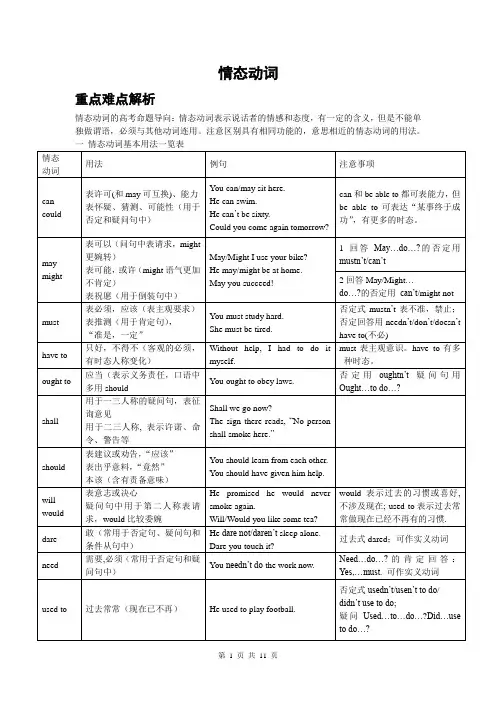
情态动词重点难点解析情态动词的高考命题导向:情态动词表示说话者的情感和态度,有一定的含义,但是不能单独做谓语,必须与其他动词连用。
注意区别具有相同功能的,意思相近的情态动词的用法。
二“情态动词+进行式”和“情态动词+完成式”用法一览表填入情态动词的恰当形式或根据括号所提供的词填入情态动词恰当的结构。
1. I should have been there, but I ____________ find the time.2. Helen _______ go on the trip with us, but she isn’t quite sure yet.3. Tom, you ___________ not leave all your clothes on the floor like this!4. You can’t imagine that a well behaved gentleman _____________ be so rude to a lady.5. It has been announced that candidates_____________ remain in their seats until all thepapers have been collected.6. ---Lucy doesn’t mind lending you her dictionary.---She ____________. I’ve already borrowed one.7. John, look at the time. _______________ you play the piano at such a late hour?8. ---__________ this book be yours?---No, it ____________ not be mine. It ___________ be his.9.As a girl, she ____________ get up at six every day.10.__________ he to clean the classroom after school?11.You ____________ be tired after the long trip, aren’t you?12.---What’s the name?---Khulaifi. __________ I spell that for you?13.You _____________________ (see) the film, haven’t you?14.You _____________________ (talk) on the phone at that time, for I couldn’t get through.15.They _____________________ (miss) the plane, or perhaps they have been prevented fromcoming for some reason.16.______________ you pass the college entrance examinations!17.He had known the matter before you told him, so you _________________ (not tell) it to him.虚拟语气重点难点解析虚拟语气的高考命题导向:虚拟语气表示说话人的愿望、假设、猜测或建议,而不是表示客观存在的事实。


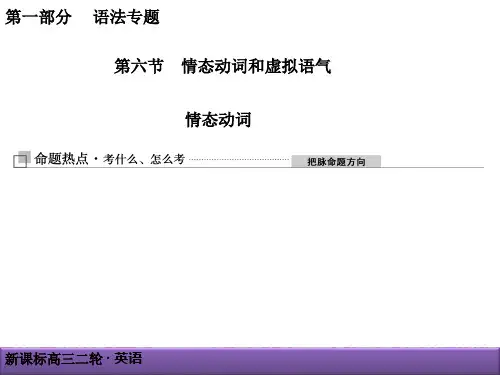
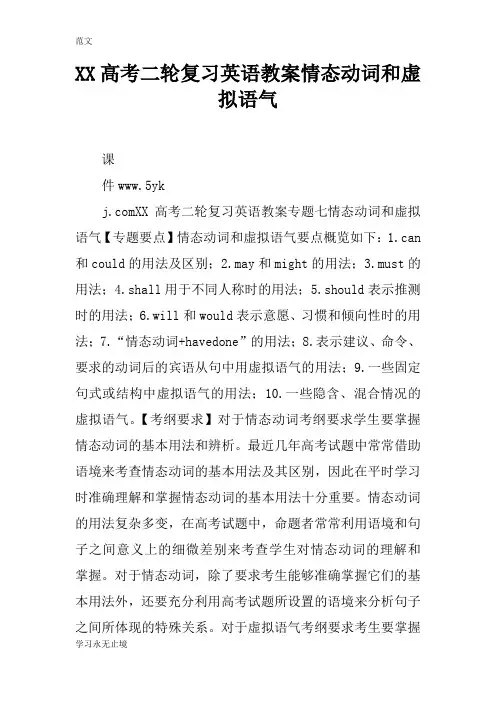
XX高考二轮复习英语教案情态动词和虚拟语气课件www.5ykXX高考二轮复习英语教案专题七情态动词和虚拟语气【专题要点】情态动词和虚拟语气要点概览如下:1.can 和could的用法及区别;2.may和might的用法;3.must的用法;4.shall用于不同人称时的用法;5.should表示推测时的用法;6.will和would表示意愿、习惯和倾向性时的用法;7.“情态动词+havedone”的用法;8.表示建议、命令、要求的动词后的宾语从句中用虚拟语气的用法;9.一些固定句式或结构中虚拟语气的用法;10.一些隐含、混合情况的虚拟语气。
【考纲要求】对于情态动词考纲要求学生要掌握情态动词的基本用法和辨析。
最近几年高考试题中常常借助语境来考查情态动词的基本用法及其区别,因此在平时学习时准确理解和掌握情态动词的基本用法十分重要。
情态动词的用法复杂多变,在高考试题中,命题者常常利用语境和句子之间意义上的细微差别来考查学生对情态动词的理解和掌握。
对于情态动词,除了要求考生能够准确掌握它们的基本用法外,还要充分利用高考试题所设置的语境来分析句子之间所体现的特殊关系。
对于虚拟语气考纲要求考生要掌握基本情态动词的用法、在各种句式、隐含、混合等句中的虚拟语气用法,根据考纲的要求,虚拟语气部分主要考查情态动词的选择、虚拟语气在条件句中、在名词性从句中、在简单句中或在日常交际中的使用等基本用法。
因此依据语境来判断虚拟语气的不同形式是高考试题的主要设题方法之一。
在近年的高考试题中,出现了对陈述语气与虚拟语气辨析的考查,虚拟语气在各种从句中的应用是该部分的重点掌握内容。
【教法指引】情态动词是高考的重要考点,看似简单,但用法相近、复杂,学生学起来有时区分不开。
首先教师应该让考生准确掌握每个情态动词的用法,然后对于相近意义的情态动词进行比较,尤其是表示推测的一些情态动词以及在虚拟语气中运用,让学生在辨析中学,在训练中体验、理解、掌握,要注重和语境结合和说话者的语气结合;其次再掌握情态动词的固定句式和固定用法即可;虚拟语气是高考考查的重点语法项目,虽然不是每套题都涉及,但在近几年的考题中也有不少出现。
高考英语语法复习专题8 情态动词和虚拟语气精品导学案(含解析)情态动词主要用来表示说话人的情感、态度等,是中学英语语法的重点,也是高考的热点,是单项填空必考的一个知识点。
情态动词在近五年高考中主要考查四点:情态动词表示推测和可能性的用法;情态动词与虚拟语气;情态动词表达“情感、态度、语气等”;情态动词表示“必要性”等方面的用法。
虚拟语气的考点主要集中在名词性从句、条件句中的用法,以及错综条件句中虚拟语气的应用。
一、情态动词表推测的用法注意:should (ought to)表示推测是高考考查的重点和难点。
如:—When can I come for the photos?I need them tomorrow afternoon. —They ________ be ready by 12:00.A.can B.should C.might D.need【解析】B A项表示推测时常用于否定句和疑问句中。
C项表示推测语气不太肯定。
should意为“按理说,理应”,既回答了顾客的询问,不失礼貌,又为照片有可能尚未洗好,顾客到时取不到留下了回旋的余地,体现了店主的精明与用词经过仔细推敲。
二、情态动词的其他用法1.can, could, may, might2.must, should3. need, dare4.shall/will/would4.shall/will/would4.shall/will/would二、情态动词+have done四、虚拟语气虚拟语气表示说话人所说的话不是事实,而是一种假设、愿望、怀疑或推测。
1.虚拟语气在条件句中的用法If it were to rain tomorrow, I should not drive my car. 如果明天下雨的话,我就不开车了。
(明天的情况还不知道)If I had done it in time, I should have had a good time. 如果我及时做的话,日子就好过多了。
情态动词和虚拟语气 第 1 页 共 9 页 情态动词和虚拟语气 【专题要点】情态动词和虚拟语气要点概览如下: 1.can和could的用法及区别; 2.may和might的用法; 3.must的用法; 4.shall用于不同人称时的用法; 5.should表示推测时的用法; 6.will和would表示意愿、习惯和倾向性时的用法; 7.“情态动词+have done”的用法; 8.表示建议、命令、要求的动词后的宾语从句中用虚拟语气的用法; 9.一些固定句式或结构中虚拟语气的用法; 10.一些隐含、混合情况的虚拟语气。 【考纲要求】对于情态动词考纲要求学生要掌握情态动词的基本用法和辨析。最近几年高考试题中常常借助语境来考查情态动词的基本用法及其区别,因此在平时学习时准确理解和掌握情态动词的基本用法十分重要。情态动词的用法复杂多变,在高考试题中,命题者常常利用语境和句子之间意义上的细微差别来考查学生对情态动词的理解和掌握。对于情态动词,除了要求考生能够准确掌握它们的基本用法外,还要充分利用高考试题所设置的语境来分析句子之间所体现的特殊关系。对于虚拟语气考纲要求考生要掌握基本情态动词的用法、在各种句式、隐含、混合等句中的虚拟语气用法,根据考纲的要求,虚拟语气部分主要考查情态动词的选择、虚拟语气在条件句中、在名词性从句中、在简单句中或在日常交际中的使用等基本用法。因此依据语境来判断虚拟语气的不同形式是高考试题的主要设题方法之一。在近年的高考试题中,出现了对陈述语气与虚拟语气辨析的考查,虚拟语气在各种从句中的应用是该部分的重点掌握内容。 【教法指引】情态动词是高考的重要考点,看似简单,但用法相近、复杂,学生学起来有时区分不开。首先教师应该让考生准确掌握每个情态动词的用法,然后对于相近意义的情态动词进行比较,尤其是表示推测的一些情态动词以及在虚拟语气中运用,让学生在辨析中学,在训练中体验、理解、掌握,要注重和语境结合和说话者的语气结合;其次再掌握情态动词的固定句式和固定用法即可;虚拟语气是高考考查的重点语法项目,虽然不是每套题都涉及,但在近几年的考题中也有不少出现。由于汉语中没有这种语法情况,对于以汉语为母语的我们来说有很大的理解难度。命题者在试题的有效信息方面越来越隐蔽,情景越来越生动,真实,考查的角度也越来越灵活。要掌握好这一语法项目,要求考生:1. 熟记并掌握虚拟语气在非真实条件句中的使用规则;2. 熟练掌握虚拟语气在名词性从句中的使用;3. 掌握一些特殊句型中要运用虚拟语气的具体规则。 【知识网络】 情态动词的用法 情态动词表示说话人对某一动作或状态的态度,可以表示“可能”、“可以”、“需要”、“必须”或“应当”等之意。情态动词没有人称和数的变化。但不能单独作谓语动词用,必须和不带to的不定式连用构成谓语动词。只有情态动词ought要和带to的动词不定式连用,在句中作谓语用。将情态动词置于主语之前即构成其疑问式,在情态动词之后加not既构成其否定式。现将各情态动词的基本用法分述如下: 1、can和could (could为can的过去式) 的基本用法 (1)表示能力,如:He can speak English better than you. (2)在疑问句和否定句中表示“怀疑”、“猜测”或“可能性”,如:Can this green bike be Liu Dong's? (3)表示“许可”时can可以和may换用,如:You can (may) go home now. (4)如果要表示语气婉转,可用could代替can,这时could不再是can的过去式,如:Could you come again tomorrow? (5)can和be able to都可表示能力,两者在意思上没有什么区别。但是can只能有现在式和过去式,而be able to则有更多的形式,如:He will be able to do the work better. 2、may和might (might为may的过去式)的基本用法 (1)表示允许或征询对方许可,有“可以”之意,如:You may use my dictionary. 在回答对方说“可以做某事”或“不可以做某事”时,一般多不用may或 may not,以避免语气生硬或不容气。而用比较婉转的说法进行回答。如:---- May I use this dictionary? ---- Yes, please. 或 ---- Certainly. 在请求对方许可时,如果Might I…? 就比用May I…? 语气更婉转些,如:May I have a look at your new computer? 但是表示“阻止”或“禁止”对方做某事时,要用must not代替may not,如:---- May we swim in this lake? ---- No, you mustn‟t. It‟s too dangerous. 情态动词和虚拟语气 第 2 页 共 9 页 (2)may或 might都可以表示可能性,表示“或许”、“可能”之意,如果用might表示可能性,则语气更加不肯定,如:They may (might) be in the library now . 3、must的基本用法 (1)must表示“必须”、“应该”之意,其否定式 must not,缩写形式为 mustn't,表示“不应该”,“不准”、“不许可”或“禁止”之意,如:We must study hard and make progress every day. You mustn't touch the fire. (2)对以must提出的疑问句,如作否定回答时,要用needn't或用don't (doesn't) have to (不 必)来回答,而不用mustn't,因为mustn't表示的是“禁止”或“不许可”之意,如:---- Must we finish the work tomorrow? ---- No, you needn't (don't have to), but you must finish it in three days. (3)在肯定句中must可以表示推测,表示“一定”或“必定”之意,如:---- Whose new bike can it be? ---- It must be Liu Dong's. I know his father has just bought him a new one. 4、can, could, may, must后接完成式的用法 (1)can, could后接完成式的用法:①在否定句或疑问句中表示对过去发生过的事情的“怀疑”或“不肯定”的态度,Could he have said so? ②在肯定句中,可以表示过去可能做到而实际并没做到的事情,有“劝告”或“责备”的语气。如:---- When did you answer her letter? ---- Only yesterday. ---- It's too late. You could have answered it earlier, I am sure. (2)may, might后接完成式的用法 ①表示对过去某事的推测,认为某一件事情在过去可能发生了。如果使用might,语气就比较婉转或更加不肯定,如:Mary might have learned some Chinese before. ②可以表示过去本来可以做到而实 际没有做到的事情,有“劝告”或“责备”的语气,如:You didn't do the work well that day. You might have done it better. (3)must后接完成式的用法:表示对过去某事的推测,认为某事在过去一定做到 了,如:Liu Dong isn‟t in the classroom. He must have gone to the library. 5、have to 的基本用法:have to和must的意义相近,只是 must侧重表示说话人的主观看法,而have to 则表示客观需要,如:I must study hard. I had to give it up because of illness. 6、ought to的基本用法 (l)表示根据某种义务或必要“应当”做某事,语气比should强,例如:Everyone ought to obey the traffic regulations. (2)表示推测,注意与must表示推测时的区别:He must be home by now .(断定他已到家),He ought to be home by now .(不十分肯定),This is where the oil must be.(比较直率) ,This is where the oil ought to be. (比较含蓄) ;(3)“ought + have+ 过去分词”表示过去应做某事而 实际未做。例如:You ought to have helped him. (but you didn‟t) 这时,ought与 should可以互相换用。注意,在美国英语中ought to 用于否定和疑问句时to可以省略。例如:Ought you smoke so much? You oughtn‟t smoke so much. 7、dare的基本用法 (l)dare (dared为其过去式) 作情态动词用时,主要用于否定句,疑问句和条件从句中,如:Dared he bread the traffic regulations again? (2)在现代英语中dare常用作行为动词,其变化与一般行为动词相同,如:She dares to stay at home alone at night. 8、need的基本用法 (1)need作情态动词用时,主要用于否定句和疑问句中,如:He needn't worry about us now. (2)need也可作为行为动词用,可用于肯定句,否定句和疑问句中,其后可接名词、代词、动名词或带 to 的动词不定式为其宾语。如:You need to practise reading aloud every day. (3)needn't后接完成式可以表示过去做了一件本来不必要做的事情,如:---- Did you answer the letter yesterday? ---- Yes, I did. ---- But you needn‟t have answered it. 9、shall的基本用法 (1)shall用作情态动词时,用于第二、三人称,表示说活人的意愿,可表示“命令”、“警告”、“强制”、“威胁”或“允诺”等意,如:He shall go first, whether he wants to or not. (2)在疑问句中,shall用于第一、三人称,表示说话人的征询对方意见或请求指示,如:Shall I open the door? 10、should的基本用法 (1)should作为情态动词可以表示“建议”或“劝告”,有“应该”之意,如:You should learn from each other. (2)should后接完成式表示过去没有做到本来应该做的事情,或是做了本来不应该做的事情。如:You should have give him more help.